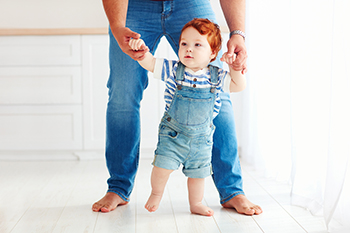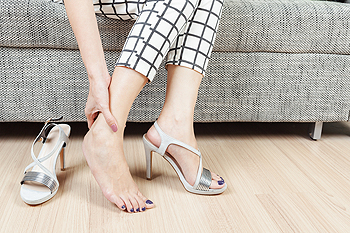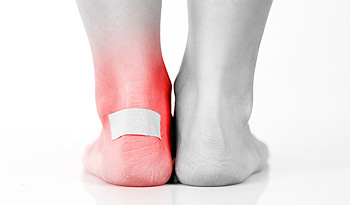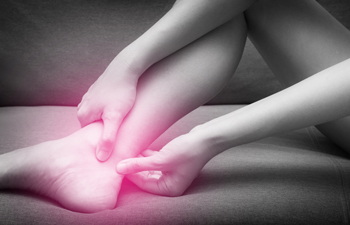Connect With Us
Blog
Items filtered by date: August 2021
What Caused My Foot Blister?
A blister on your foot is usually the result of friction from your shoes or socks rubbing against a concentrated area of skin and causing the top layer of skin to separate from the layers beneath it. Although they can be painful, red, and swollen, friction blisters usually heal without medical intervention. But not all blisters are caused by friction. Severe burns and sunburns may produce blisters. Contact dermatitis, caused by a foreign substance irritating the skin, is another common cause of blisters. Certain skin conditions, such as chickenpox and eczema, may also result in foot blisters. If you have blisters on your feet and are unsure of the cause, or if your blisters are painful and not improving over time, please consult with a podiatrist.
Blisters are prone to making everyday activities extremely uncomfortable. If your feet are hurting, contact one of our podiatrists of Family Foot and Ankle Care of Moriches. Our doctors can provide the care you need to keep you pain-free and on your feet.
Foot Blisters
Foot blisters develop as a result of constantly wearing tight or ill-fitting footwear. This happens due to the constant rubbing from the shoe, which can often lead to pain.
What Are Foot Blisters?
A foot blister is a small fluid-filled pocket that forms on the upper-most layer of the skin. Blisters are filled with clear fluid and can lead to blood drainage or pus if the area becomes infected.
How Do Blisters Form?
Blisters on the feet are often the result of constant friction of skin and material, usually by shoe rubbing. Walking in sandals, boots, or shoes that don’t fit properly for long periods of time can result in a blister. Having consistent foot moisture and humidity can easily lead to blister formation.
Prevention & Treatment
It is important to properly care for the affected area in order to prevent infection and ease the pain. Do not lance the blister and use a Band-Aid to provide pain relief. Also, be sure to keep your feet dry and wear proper fitting shoes. If you see blood or pus in a blister, seek assistance from a podiatrist.
If you have any questions, please feel free to contact our offices located in Moriches and Shirley, NY . We offer the newest diagnostic and treatment technologies for all your foot care needs.
Who Can Achilles Tendonitis Affect?
The Achilles tendon connects the heel with two large muscles in the calf that allows the foot to push off. This pushing off motion is necessary for walking, running, and jumping. Achilles tendonitis is a painful inflammation of this tendon where it connects at the heel. In younger people, Achilles tendonitis may develop from overuse. This may be from increasing the intensity of an activity suddenly, running too often on hard surfaces for longer distances, jumping excessively, or wearing shoes without proper support. It may also occur if the foot turns in or out abruptly. In older and middle-aged adults, Achilles tendonitis may be caused by arthritis, bone spurs, and other conditions that aggravate or put excess tension on the tendon. If you have pain in your heel a podiatrist can examine you to determine the origin and develop an effective treatment plan that is specific for you.
Achilles tendon injuries need immediate attention to avoid future complications. If you have any concerns, contact one of our podiatrists of Family Foot and Ankle Care of Moriches. Our doctors can provide the care you need to keep you pain-free and on your feet.
What Is the Achilles Tendon?
The Achilles tendon is a tendon that connects the lower leg muscles and calf to the heel of the foot. It is the strongest tendon in the human body and is essential for making movement possible. Because this tendon is such an integral part of the body, any injuries to it can create immense difficulties and should immediately be presented to a doctor.
What Are the Symptoms of an Achilles Tendon Injury?
There are various types of injuries that can affect the Achilles tendon. The two most common injuries are Achilles tendinitis and ruptures of the tendon.
Achilles Tendinitis Symptoms
- Inflammation
- Dull to severe pain
- Increased blood flow to the tendon
- Thickening of the tendon
Rupture Symptoms
- Extreme pain and swelling in the foot
- Total immobility
Treatment and Prevention
Achilles tendon injuries are diagnosed by a thorough physical evaluation, which can include an MRI. Treatment involves rest, physical therapy, and in some cases, surgery. However, various preventative measures can be taken to avoid these injuries, such as:
- Thorough stretching of the tendon before and after exercise
- Strengthening exercises like calf raises, squats, leg curls, leg extensions, leg raises, lunges, and leg presses
If you have any questions please feel free to contact our offices located in Moriches and Shirley, NY . We offer the newest diagnostic tools and technology to treat your foot and ankle needs.
The Many Causes of Heel Pain
 Heel pain can have a variety of causes, but the most common cause of it is plantar fasciitis. This occurs when the long band of tissue on the sole of the foot becomes inflamed. Women late in their pregnancy and people who waitress or work on their feet all day may be more at risk for developing this type of heel pain. Other causes of heel pain can include: a small crack in the heel bone, compressed nerves, worn down heel pads, nerve damage, thickened tissue surrounding a nerve, inflammation of the tendon that connects the heel bone with the calf muscles, plantar warts, and abnormalities in the bone which can causes inflammation of the bursa sac. There may also be injury to the tunnel between the heel and talus bones known as Sinus Tarsi Syndrome. If you are struggling with any type of pain in your heel it is suggested that you schedule an appointment with a podiatrist for an accurate diagnosis and proper treatment.
Heel pain can have a variety of causes, but the most common cause of it is plantar fasciitis. This occurs when the long band of tissue on the sole of the foot becomes inflamed. Women late in their pregnancy and people who waitress or work on their feet all day may be more at risk for developing this type of heel pain. Other causes of heel pain can include: a small crack in the heel bone, compressed nerves, worn down heel pads, nerve damage, thickened tissue surrounding a nerve, inflammation of the tendon that connects the heel bone with the calf muscles, plantar warts, and abnormalities in the bone which can causes inflammation of the bursa sac. There may also be injury to the tunnel between the heel and talus bones known as Sinus Tarsi Syndrome. If you are struggling with any type of pain in your heel it is suggested that you schedule an appointment with a podiatrist for an accurate diagnosis and proper treatment.
Many people suffer from bouts of heel pain. For more information, contact one of our podiatrists of Family Foot and Ankle Care of Moriches. Our doctors can provide the care you need to keep you pain-free and on your feet.
Causes of Heel Pain
Heel pain is often associated with plantar fasciitis. The plantar fascia is a band of tissues that extends along the bottom of the foot. A rip or tear in this ligament can cause inflammation of the tissue.
Achilles tendonitis is another cause of heel pain. Inflammation of the Achilles tendon will cause pain from fractures and muscle tearing. Lack of flexibility is also another symptom.
Heel spurs are another cause of pain. When the tissues of the plantar fascia undergo a great deal of stress, it can lead to ligament separation from the heel bone, causing heel spurs.
Why Might Heel Pain Occur?
- Wearing ill-fitting shoes
- Wearing non-supportive shoes
- Weight change
- Excessive running
Treatments
Heel pain should be treated as soon as possible for immediate results. Keeping your feet in a stress-free environment will help. If you suffer from Achilles tendonitis or plantar fasciitis, applying ice will reduce the swelling. Stretching before an exercise like running will help the muscles. Using all these tips will help make heel pain a condition of the past.
If you have any questions please contact our offices located in Moriches and Shirley, NY . We offer the newest diagnostic and treatment technologies for all your foot and ankle needs.
Do Parents Understand Their Children’s Foot Development?
 There are many parents that are concerned with the development of their children’s feet. This can range from when to purchase their first pair of shoes, to observing foot conditions that may have developed. There are studies that have been performed that have shown parents understand the importance of having their children walking barefoot while indoors. This can be beneficial in strengthening the entire foot as the toes grip the floor. Additionally, measuring the feet frequently is helpful in determining what size shoe is perfect for their feet. Additionally, many parents choose the type of shoes based on price, and what the shoes will be worn for, including school or play. If you would like more information about children’s foot development at specific ages, please schedule an appointment with a podiatrist.
There are many parents that are concerned with the development of their children’s feet. This can range from when to purchase their first pair of shoes, to observing foot conditions that may have developed. There are studies that have been performed that have shown parents understand the importance of having their children walking barefoot while indoors. This can be beneficial in strengthening the entire foot as the toes grip the floor. Additionally, measuring the feet frequently is helpful in determining what size shoe is perfect for their feet. Additionally, many parents choose the type of shoes based on price, and what the shoes will be worn for, including school or play. If you would like more information about children’s foot development at specific ages, please schedule an appointment with a podiatrist.
Making sure that your children maintain good foot health is very important as they grow. If you have any questions, contact one of our podiatrists of Family Foot and Ankle Care of Moriches. Our doctors can provide the care you need to keep you pain-free and on your feet.
Keeping Children's Feet Healthy
Having healthy feet during childhood can help prevent medical problems later in life, namely in the back and legs. As children grow, their feet require different types of care. Here are some things to consider...
Although babies do not walk yet, it is still very important to take care of their feet.
Avoid putting tight shoes or socks on his or her feet.
Allow the baby to stretch and kick his or her feet to feel comfortable.
As a toddler, kids are now on the move and begin to develop differently. At this age, toddlers are getting a feel for walking, so don’t be alarmed if your toddler is unsteady or ‘walks funny’.
As your child gets older, it is important to teach them how to take care of their feet.
Show them proper hygiene to prevent infections such as fungus.
Be watchful for any pain or injury.
Have all injuries checked by a doctor as soon as possible.
Comfortable, protective shoes should always be worn, especially at play.
If you have any questions please feel free to contact our offices located in Moriches and Shirley, NY . We offer the newest diagnostic and treatment technologies for all your foot and ankle needs.
How High Heels Can Damage the Feet
 Wearing high heels can be stylish, but wearing them too often may have severe long term impacts on the feet. While wearing high heels, the ankles are forced to bend forward and essentially make it like the wearer is standing on their tip toes. This can lead to potential problems like restricting blood circulation, or shortening of the calf muscles as well as the Achilles tendon. High heels with a narrow toe box can lead to other problems too, such as bunions. Because of the stress that these shoes put on the body, osteoarthritis is yet another condition that may result from wearing high heels frequently. Not only do high heels have an impact on the feet, but high heels can lead to concerns with your back and knees as well. If you are experiencing any problems with your feet due to high heels, please consult with your local podiatrist. A podiatrist will be able to treat any foot condition that may have developed, as well as provide shoe inserts or orthotics, and make recommendations on other stylish shoes that can be healthier for your feet.
Wearing high heels can be stylish, but wearing them too often may have severe long term impacts on the feet. While wearing high heels, the ankles are forced to bend forward and essentially make it like the wearer is standing on their tip toes. This can lead to potential problems like restricting blood circulation, or shortening of the calf muscles as well as the Achilles tendon. High heels with a narrow toe box can lead to other problems too, such as bunions. Because of the stress that these shoes put on the body, osteoarthritis is yet another condition that may result from wearing high heels frequently. Not only do high heels have an impact on the feet, but high heels can lead to concerns with your back and knees as well. If you are experiencing any problems with your feet due to high heels, please consult with your local podiatrist. A podiatrist will be able to treat any foot condition that may have developed, as well as provide shoe inserts or orthotics, and make recommendations on other stylish shoes that can be healthier for your feet.
High heels have a history of causing foot and ankle problems. If you have any concerns about your feet or ankles, contact one of our podiatrists from Family Foot and Ankle Care of Moriches. Our doctors can provide the care you need to keep you pain-free and on your feet.
Effects of High Heels on the Feet
High heels are popular shoes among women because of their many styles and societal appeal. Despite this, high heels can still cause many health problems if worn too frequently.
Which Parts of My Body Will Be Affected by High Heels?
- Ankle Joints
- Achilles Tendon – May shorten and stiffen with prolonged wear
- Balls of the Feet
- Knees – Heels cause the knees to bend constantly, creating stress on them
- Back – They decrease the spine’s ability to absorb shock, which may lead to back pain. The vertebrae of the lower back may compress.
What Kinds of Foot Problems Can Develop from Wearing High Heels?
- Corns
- Calluses
- Hammertoe
- Bunions
- Morton’s Neuroma
- Plantar Fasciitis
How Can I Still Wear High Heels and Maintain Foot Health?
If you want to wear high heeled shoes, make sure that you are not wearing them every day, as this will help prevent long term physical problems. Try wearing thicker heels as opposed to stilettos to distribute weight more evenly across the feet. Always make sure you are wearing the proper shoes for the right occasion, such as sneakers for exercising. If you walk to work, try carrying your heels with you and changing into them once you arrive at work. Adding inserts to your heels can help cushion your feet and absorb shock. Full foot inserts or metatarsal pads are available.
If you have any questions please feel free to contact our offices located in Moriches and Shirley, NY . We offer the newest diagnostic and treatment technologies for all your foot and ankle needs.
Do Your Child's Feet Hurt?
Blog Archives
- April 2024
- March 2024
- February 2024
- January 2024
- December 2023
- November 2023
- October 2023
- September 2023
- August 2023
- July 2023
- June 2023
- May 2023
- April 2023
- March 2023
- February 2023
- January 2023
- December 2022
- November 2022
- October 2022
- September 2022
- August 2022
- July 2022
- June 2022
- May 2022
- April 2022
- March 2022
- February 2022
- January 2022
- December 2021
- November 2021
- October 2021
- September 2021
- August 2021
- July 2021
- June 2021
- May 2021
- April 2021
- March 2021
- February 2021
- January 2021
- December 2020
- November 2020
- October 2020
- September 2020
- August 2020
- July 2020
- June 2020
- May 2020
- April 2020
- March 2020
- February 2020
- January 2020
- December 2019
- November 2019
- October 2019
- September 2019
- August 2019
- July 2019
- June 2019
- May 2019
- April 2019
- March 2019
- February 2019
- January 2019
- December 2018
- November 2018
- October 2018
- September 2018
- August 2018
- July 2018
- June 2018
- May 2018
- April 2018
- March 2018
- February 2018
- January 2018
- December 2017
- November 2017
- October 2017
- September 2017
- August 2017
- July 2017
- June 2017
- May 2017
- April 2017
- March 2017
- February 2017
- January 2017
- December 2016
- November 2016
- October 2016
- September 2016
- August 2016
- July 2016
- June 2016
- October 2015
- September 2015
- August 2015
- July 2015
- June 2015
- May 2015
- April 2015






